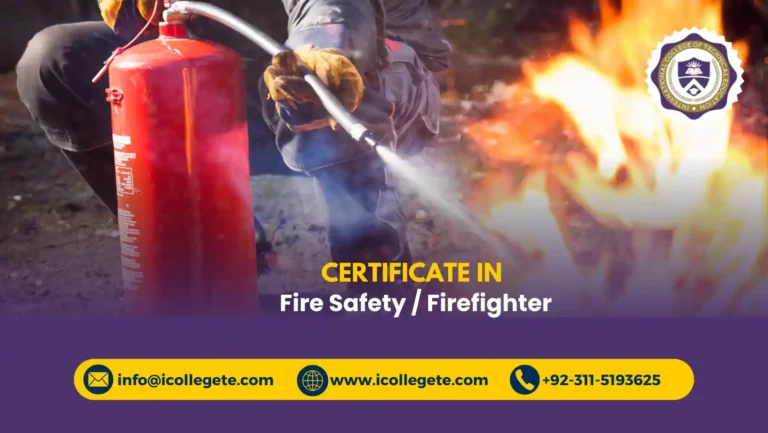The OSHA 30-Hour course is a vital program for anyone working in industries that require a focus on workplace safety and health standards. Designed to provide participants with a comprehensive understanding of OSHA regulations and workplace safety practices, the course is ideal for supervisors and workers who are tasked with maintaining a safe working environment. For those in Rawalpindi looking to advance their knowledge in occupational safety, this course offers the necessary tools and insights.
The OSHA 30-Hour course, offered in Rawalpindi, is a specialized training program that educates workers, supervisors, and safety officers about the Occupational Safety and Health Administration’s (OSHA) standards and regulations. This course is aimed at preventing accidents, reducing workplace hazards, and promoting overall safety in a variety of work environments. It focuses on equipping participants with the knowledge needed to identify risks, implement safety measures, and ensure compliance with federal safety standards.
The OSHA 30-Hour course covers essential safety and health topics for those working in construction and general industry sectors. Participants will gain a thorough understanding of OSHA regulations, hazard recognition, and best practices to ensure workplace safety. The training includes both theoretical knowledge and practical application, with an emphasis on preventing accidents and injuries.
This course is not just about understanding rules; it empowers workers and supervisors to recognize potential hazards, respond appropriately, and foster a culture of safety at the workplace.
Study Units
The OSHA 30-Hour course is divided into several study units, each focusing on critical aspects of occupational safety. The key study units include:
- Introduction to OSHA: Understanding the role of OSHA in ensuring safe and healthy workplaces, including key regulations and enforcement procedures.
- Workplace Hazards and Risk Assessment: Identifying various types of hazards such as chemical, physical, electrical, and biological risks, and learning how to assess and control them.
- Personal Protective Equipment (PPE): Understanding the importance of PPE and how to properly select, use, and maintain personal protective gear to minimize risks.
- Fall Protection: Learning about fall hazards and the best practices for fall prevention, including the use of fall protection systems.
- Electrical Safety: Identifying electrical hazards in the workplace and understanding safe work practices when dealing with electrical systems.
- Emergency Preparedness and Response: Preparing for workplace emergencies, including fire, chemical spills, and medical emergencies, and knowing how to respond effectively.
- Material Handling and Storage: Proper handling, storage, and disposal of materials to prevent accidents and injuries.
- Workplace Safety Programs and Compliance: Developing and implementing safety programs and understanding the compliance requirements related to OSHA regulations.
- Safety Inspections and Reporting: Conducting safety inspections, identifying hazards, and ensuring corrective actions are taken.
- Health and Environmental Controls: Addressing workplace health concerns and ensuring compliance with environmental safety regulations.
Learning Outcomes
Upon completing the OSHA 30-Hour course, participants will be able to:
- Understand and apply OSHA regulations and guidelines in the workplace.
- Identify common workplace hazards and take proactive measures to control or eliminate them.
- Use personal protective equipment (PPE) correctly and ensure that it is appropriate for the specific hazards.
- Implement safety protocols to reduce the risk of workplace accidents and injuries.
- Prepare for and respond effectively to workplace emergencies.
- Conduct workplace inspections and address safety issues in compliance with OSHA standards.
- Foster a culture of safety within their teams and organizations, leading by example.
Course Benefits
The OSHA 30-Hour course in Rawalpindi offers a range of benefits for individuals and organizations. These include:
- Enhanced Workplace Safety: By equipping employees with knowledge of OSHA regulations, organizations can significantly reduce workplace accidents and injuries.
- Legal Compliance: Completing the OSHA 30-Hour course ensures compliance with federal and local safety regulations, helping businesses avoid legal issues and penalties.
- Improved Risk Management: Participants learn how to identify and assess potential risks, allowing them to implement preventive measures that minimize the likelihood of accidents.
- Increased Career Opportunities: Workers and supervisors who complete this course are often in higher demand, as employers value safety-conscious employees who can contribute to a safe working environment.
- Increased Employer Confidence: Employers benefit from having OSHA-trained personnel who can improve the overall safety culture and reduce insurance premiums due to fewer workplace accidents.
- Certification: Successful completion of the course grants participants an official OSHA 30-Hour certification, which is recognized in industries across the globe.
Who is This Course For?
The OSHA 30-Hour course is designed for individuals in supervisory or management positions or those who play an active role in workplace safety. It is ideal for:
- Supervisors, foremen, and team leaders in construction and general industry.
- Health and safety officers or safety managers responsible for ensuring workplace safety.
- Project managers or site managers overseeing construction or industrial projects.
- Workers seeking to enhance their knowledge of OSHA regulations and workplace safety.
- Employers and HR professionals who want to ensure that their teams are well-versed in safety practices.
Future Progression for This Course
The OSHA 30-Hour course provides a solid foundation for career advancement in occupational safety and health. After completing the course, participants can pursue additional certifications or courses to further their expertise in safety management. Potential future career paths include:
- OSHA 500/510 Trainer Courses: For those interested in becoming OSHA-authorized trainers who can teach the 10-Hour and 30-Hour courses to others.
- Certified Safety Professional (CSP): A higher-level certification for those wishing to become experts in the field of safety management.
- Safety Manager/Coordinator: Individuals can progress into roles where they are responsible for managing safety programs across entire organizations or large projects.
- Environmental Health and Safety (EHS) Specialist: EHS specialists focus on environmental and workplace health regulations, offering career growth in both public and private sectors.
- Occupational Health and Safety Consultant: Experienced individuals may move into consulting roles, helping organizations improve their safety practices and ensure compliance with health and safety regulations.
Additionally, participants may choose to specialize further in areas such as construction safety, industrial hygiene, or risk management.
The OSHA 30-Hour course in Rawalpindi is a valuable program for anyone looking to enhance their career in occupational safety and health. Whether you’re a supervisor, safety officer, or worker, this course equips you with the knowledge and skills necessary to create a safer work environment, comply with regulations, and reduce risks. By completing the course, you not only improve workplace safety but also open doors for career advancement in the growing field of safety management.






